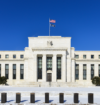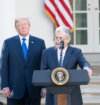Printer No Longer Going Full Brrr

Thanks to vaccine progress and strong economic activity, the Fed Reserve announced they are going to dial back their asset purchases one month and $15 billion at a time…(FOMC)
- TREASURY securities will be reduced at a pace of $10 billion month
- MORTGAGE-BACKED securities will be reduced at a pace of $5 billion a month
NOTE: The FOMC plans to continue this reduction of net asset purchases each month, but it is prepared to adjust the pace of purchases if warranted by changes in the economic outlook.
The target range for the federal funds rate, expectedly, remains unchanged at 0 to 1/4 percent and expects it will be appropriate to maintain this target range for the time being.
- FOMC says they won’t move on rates until labor market conditions “have reached levels consistent with the Committee’s assessments of maximum employment and inflation has risen to 2 percent and is on track to moderately exceed 2 percent for some time.”
NOT OUT OF THE WOODS: the FOMC notes that the path of the economy continues to be controlled by the virus. “Progress on vaccinations and an easing of supply constraints are expected to support continued gains in economic activity and employment as well as a reduction in inflation. Risks to the economic outlook remain.”
Chairman Jerome Powell did address inflation in a press conference after the FOMC statement release…
- All about supply chains. Powell said “supply chain disruptions are limiting how quickly production can respond to the rebound in demand in the near term. As a result, overall inflation is running well above our 2% longer-run goal.” Powell also made it clear the Fed did not have any tools to fix the supply chain problems that persist.
- Sticking to transitory. Powell is not letting the transitory argument die. He said that The Fed “like most forecasters, we continue to believe that our dynamic economy will adjust to the supply and demand imbalances and as it does inflation will decline to levels much closer to our 2% longer run goal.”
- When will it end? Powell said “we expect that as bottlenecks dissipate, we’ll see inflation move down in second or third quarter or next year. Watching carefully to see if economy evolves in line with expectations, policy will adapt appropriately.”


